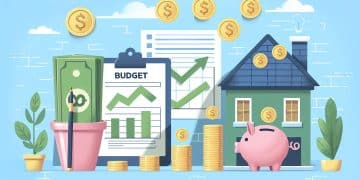Master Personal Budgeting: Achieve Financial Freedom Effectively

Anúncios

Introduction
In a world where financial stability often feels elusive, mastering personal budgeting can be the key to unlocking a secure future. Bolstered by rising living costs and stagnant incomes, managing personal finances has never been more vital. A robust budget helps individuals take control of their financial destinies. Whether the goal is to save for future plans, pay off debts, or maintain financial stability, understanding the nuances of budgeting is invaluable.
Personal budgeting transcends mere number crunching; it’s about strategic planning and foresight. At the heart of budgeting is an insightful look at income and expenses, allowing for informed financial decisions. By accurately tracking monetary flow, one can prioritize spending and savings effectively. It means understanding where every dollar goes and ensuring that each expenditure aligns with larger financial goals.
Embarking on a budgeting journey might seem daunting, but its rewards are manifold. Having a personalized budget cultivates financial awareness and opens a pathway toward debt management and stress reduction. Implementing a clear financial plan provides individuals with confidence, offering a sense of control amidst economic turbulence. Budgeting is a journey toward financial freedom that empowers individuals to achieve their personal and financial aspirations.
Anúncios
What is Personal Budgeting?
Personal budgeting involves meticulously planning how to allocate your money to meet both needs and wants. It begins by comprehensively understanding monthly income and categorizing expenses. Expenses should be broken down into fixed and variable categories for clarity. The essence of budgeting lies in ensuring that income sufficiently covers these expenses while allowing room for savings and investments.
Creating a personal budget is subject to individual priorities and life goals. While some may aim to purchase a home, others might focus on establishing a secure retirement fund. The personalization of each budget plan ensures it is effective and resonates with individual aspirations. Each financial move within the budget should contribute to the realization of these personal milestones and goals.
To craft an efficient budget, individuals must establish both short-term and long-term financial objectives. Short-term goals can include reducing or eliminating credit card debt, while long-term goals might involve securing funds for a child’s education. A clearly defined aim provides purpose and direction, ensuring day-to-day financial decisions support overarching life plans.
Anúncios
Regularly revisiting and adjusting the budget is crucial as financial circumstances change. Life’s unpredictability demands flexibility in budgeting; what worked last month might require modification. By assessing changes in income or lifestyle, individuals can adapt their budgets accordingly, ensuring ongoing relevance and effectiveness. Proper tracking tools further streamline this process.
Personal Budgeting: A Comprehensive Overview
Budgeting offers an organized approach to achieving financial security. From initiating accurate income assessment to regularly refining the budget, strategic steps must be taken. Various steps guide individuals toward effective budgeting, each tailored to securing financial stability. These preparatory steps serve as a foundation for managing and achieving fiscal goals.
To commence, an honest assessment of financial inflow is required. This involves accounting for monthly salary, bonuses, or any additional income streams. Only with a clear understanding of income can a realistic budget be designed. Next, distinguishing fixed expenses, like rent, from variable ones, like dining out, sets the budgeting benchmark.
A pivotal component involves setting and aligning budgetary goals with personal aspirations. If saving for vacations or educational investments, establishing these objectives helps define and steer financial decisions. A structured allocation of finances follows, ensuring essentials and subsequent savings are adequately funded. This division of finances supports sustained financial well-being.
Characteristics of Personal Budgeting
- Comprehensive income assessment
- Diligent tracking of fixed and variable expenses
- Alignment with personal financial goals
- Flexibility for financial changes and unexpected expenses
- Use of technology for precise tracking and adjustment
Benefits of Personal Budgeting
Effective personal budgeting empowers individuals with financial autonomy, reduces monetary stress, and promotes stability. One of the most significant benefits is enhanced financial awareness. A thoroughly crafted budget offers visibility into spending patterns, promoting informed decisions and financial discipline. This awareness is the cornerstone of fiscal health.
Another advantage of personal budgeting is stress mitigation. A clear financial plan provides assurance amidst economic uncertainties, reducing anxiety associated with unplanned expenses. Moreover, budgeting is instrumental in achieving set goals, whether as modest as reducing daily expenditures or as ambitious as preparing for retirement, fostering a sense of accomplishment.
The discipline acquired through budgeting also lends itself to efficient debt management. By prioritizing debt repayment, individuals reduce financial burdens and interest costs, leading to quicker financial independence. This strategic debt minimization is a testament to the power of a well-implemented budget, offering individuals a pathway to realize financial dreams.
Furthermore, embracing budgeting encourages continuous financial learning and discipline. Individuals who remain proactive about understanding personal finance show improved decision-making skills, leading to enhanced financial literacy. Such education supports smarter investments and sustained wealth management. Budgeting also integrates technological conveniences to enhance precision in tracking and reviewing finances.
Ultimately, personal budgeting is a dynamic process. By providing control and direction over finances, it empowers individuals to navigate economic pathways with confidence. With perseverance and adaptability, anyone can leverage budgeting to secure a prosperous and financially sound future, making it an essential practice for aspiring financial freedom seekers.
- Financial awareness and informed decision-making
- Stress reduction and economic assurance
- Effective debt management
- Enhanced financial literacy and educational growth
- Support for achieving both short-term and long-term goals





